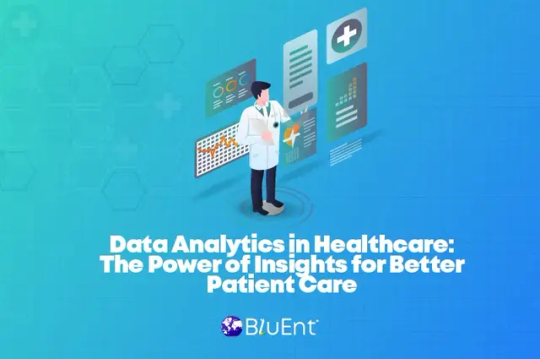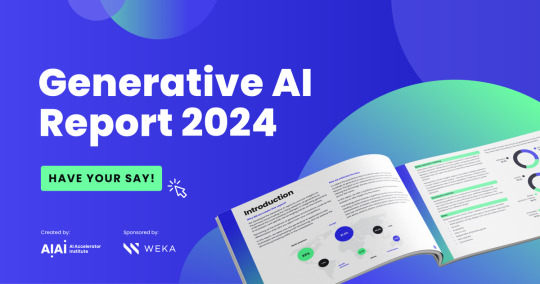#Data Analytics in Healthcare
Photo

The Healthcare Analytics Market is expected to grow at a CAGR of 26% from 2020 to reach $84.2 billion by 2027.
Healthcare analytics tools help reveal and understand historical data patterns, predict future events, and provide actionable insights to make fact-based decisions and improve clinical, financial, and operational performance of healthcare organizations.
Learn More-
https://www.digiprima.com/healthcare-software-development-services
#healthcare organizations#healthcare data#data analytics in healthcare#actionable insights#healthcaredatamanagement#CAGR#globalmarketreport#dataanalytics
2 notes
·
View notes
Text
Data analytics plays a pivotal role in transforming this data into actionable insights, enhancing decision-making. From refining diagnosis accuracy to streamlining healthcare costs, its benefits are vast and transformative.
0 notes
Text
In this blog, I have covered the data analytics use cases for healthcare sector. Here are real-world use cases for data analytics for healthcare businesses.
0 notes
Text
How Hospitals Can Use Data Analytics in Healthcare for Better Outcomes

Data analytics in healthcare is one of the medical industry's driving forces, revolutionizing how patients are cared for. It can even reduce expenses and streamline internal and other medical processes at a corporate level.
The use of healthcare data analytics enables more individualized treatments, better decision-making, and patient well-being. Hospitals leveraging big data analytics and insights are more likely to get quicker and more precise findings to take accurate precautionary actions.
A recent report projected that the healthcare analytics market will reach 85.9 billion by 2027, growing at a CAGR of 25.7%.
Using data analytics, the medical industry can choose between treatments or surgeries and forecast the course of major health occurrences. With this, health experts can initiate long-standing plans based on data-driven reports and analyses that swiftly collect and deliver comprehensive & reliable data.
In this blog, we will give you an overview of big data analytics in healthcare and how it is used to improve outcomes in the healthcare industry.
Healthcare Analytics: Offering Real-Time Information
Data analytics in healthcare examines recent and past medical data to forecast developments and trends, enhance outreach, and control disease transmission.
It also involves the role of predictive analytics in healthcare to enhance the standard of patient care, medical data, diagnostics, company operations, and administration using micro and macro insights.
According to GrandViewResearch's study, healthcare analytics's current market size value is USD 43.1 billion, which will turn into USD 167.0 billion in 2030.
0 notes
Text
Top Benefits of Healthcare Analytics for Patient Patient

This article showcase the different ways the healthcare analytics improve the patient’s care and deliver better patient experience, Also in brief write benefits of healthcare mobile apps.
0 notes
Text
This transformation is not only enhancing the capabilities of healthcare professionals but also revolutionizing the way patient care is optimized. From personalized medicine to streamlining healthcare operations, data analytics has emerged as an indispensable tool for healthcare organizations. Nevertheless, harnessing the full potential of data analytics in healthcare necessitates specialized training and expertise. If you're looking for comprehensive training, consider enrolling in our Data Analytics Certification Training program in Delhi. This course is designed to provide you with all the essential skills and knowledge required for success in this field.
0 notes
Text

How Data Analytics is Driving the Future of Healthcare
Know how the power of data analytics in the healthcare industry is helping to take better clinical, operational & financial decisions and improve patient care.
0 notes
Text

Delve into the intricate dynamics of the healthcare market research industry with our in-depth analysis and expertise. Stay ahead of the curve amidst shifting trends, regulatory changes, and evolving consumer behaviors. Harness the power of data-driven insights to navigate challenges and capitalize on opportunities in this dynamic sector.
To know more: online market research company
consumer market research
healthcare market research
3 notes
·
View notes
Text
The Transformative Benefits of Artificial Intelligence
Title: The Transformative Benefits of Artificial Intelligence
Artificial Intelligence (AI) has emerged as one of the most revolutionary technologies of the 21st century. It involves creating intelligent machines that can mimic human cognitive functions such as learning, reasoning, problem-solving, and decision-making. As AI continues to advance, its impact is felt across various industries and…

View On WordPress
#Advancements in Education#AI Advantages#AI Benefits#artificial intelligence#Customer Experience#Data Analysis#Data Analytics#Decision-Making#Efficiency and Productivity#Energy Management#Ethical AI Deployment.#Healthcare Transformation#Machine Learning#Personalized Learning#Personalized User Experiences#Robotics in Healthcare#Smart Cities#Smart Technology#Smart Traffic Management#Sustainable Development
2 notes
·
View notes
Link
Healthcare Analytics Software Development enables accurate and timely data analysis for better clinical decision-making, saving lives & costs.
According to a recent survey, the healthcare sector produces immense quantities of data via electronic medical records (EMR), electronic health records (EHR), and health information exchange (HIE). Nonetheless, the difficulty arises in competently examining and leveraging this data to enhance decision-making and proficiently manage it. Healthcare analytics software development services provide an answer to these predicaments.
Healthcare analytics can also be integrated with telemedicine app development and can help various features in this type of heathcare app development
#predictive analytics in healthcare#Healthcare Analytics Software#Healthcare Analytics Software Development#healthcare data analysis software#healthcare data analytics software#Healthcare Data Analytics#business intelligence software for healthcare#clinical analytics software#Clinical Decision Support Systems#data analytics software for healthcare#health analysis software#health catalyst data operating system#Health Information Exchange#healthcare bi software#Healthcare Business Intelligence#healthcare business intelligence tools#Healthcare Information Systems#healthcare predictive analytics software#hospital analytics software#Healthcare Quality Management#medical analytics software#medical data analysis software#Population Health Management#population health analytics software
2 notes
·
View notes
Link
#sift healthcare#data science#ai#artificial intelligence#health tech#analytics#machine learning#revenue cycle management#health it
1 note
·
View note
Text
The impact and challenges of generative AI in healthcare
New Post has been published on https://thedigitalinsider.com/the-impact-and-challenges-of-generative-ai-in-healthcare/
The impact and challenges of generative AI in healthcare

Generative AI is transforming multiple sectors, including healthcare, where its capabilities to synthesize and analyze vast data types are being leveraged by major tech companies and innovative startups.
In a significant collaboration, Google Cloud is working with Highmark Health to create artificial intelligence tools aimed at improving patient intake processes. Amazon’s AWS is exploring the uses of generative AI for social health determinants analysis in medical databases. Microsoft Azure’s collaboration with the Providence healthcare network focuses on AI systems that prioritize and manage patient communications automatically.
The startup ecosystem is buzzing with activity around generative AI: Ambience Healthcare is developing an app specifically for clinicians, Nabla offers an AI assistant for healthcare providers, and Abridge is enhancing medical documentation through analytics tools.
These efforts are drawing substantial investment, indicating strong confidence among health investors about the potential of generative AI in this field.
Mixed reactions from industry and consumers
The healthcare industry and its consumers show mixed feelings about the readiness and appropriateness of generative AI technologies. For example, a Deloitte survey revealed that only 53% of U.S. consumers see generative AI as a potential enhancer of healthcare accessibility and efficiency.
Andrew Borkowski from VA Sunshine Healthcare Network highlights that generative AI may not be mature enough for healthcare deployment, citing its current limitations in handling complex medical issues and emergencies due to outdated data and lack of human expertise.
Computer Vision in Healthcare: Download the eBook today
Unlock the mystery of the innovative intersection of technology and medicine with our latest eBook, Computer Vision in Healthcare.

Concerns over diagnostic accuracy and data handling
OpenAI’s ChatGPT has shown vulnerabilities, such as a high error rate in pediatric disease diagnosis, raising concerns about its practical utility in critical healthcare applications. Moreover, generative AI’s struggles with routine medical administrative tasks raise further reliability issues.
There’s also a broader ethical debate about the use of AI in sensitive sectors like healthcare, particularly concerning privacy, security, and data integrity. The medical community stresses the necessity of rigorous scientific testing and regulatory compliance before these technologies can be fully integrated into healthcare practices.
Potential for bias and stereotyping
One critical issue with generative AI in healthcare is its potential to perpetuate stereotypes. A study from Stanford Medicine demonstrated how generative AI could reinforce erroneous beliefs about biological differences among races, which could lead to misdiagnosis and unequal treatment.
Despite these challenges, generative AI holds promise for complex applications like medical imaging. Research shows AI could enhance diagnostic accuracy and reduce workflow inefficiencies in imaging departments.
The need for rigorous validation
As the technology advances, healthcare professionals emphasize the need for thorough validation studies to ensure generative AI’s efficacy and safety. The World Health Organization advocates for strong oversight and ethical guidelines to govern the deployment of AI technologies in healthcare.
In conclusion, while generative AI offers exciting prospects for transforming healthcare, significant hurdles related to accuracy, ethics, and patient safety must be addressed. The industry must proceed cautiously, ensuring that these powerful tools do indeed benefit all patients without compromising care quality or ethics.
Share your generative AI insights and help shape the community!
Generative Artificial Intelligence Report 2024
We’re diving deep into the world of generative artificial intelligence with our new report: Generative AI 2024, which will explore how and why companies are (or aren’t) using this technology.


Like what you see? Then check out tonnes more.
From exclusive content by industry experts and an ever-increasing bank of real world use cases, to 80+
deep-dive summit presentations, our membership plans are packed with awesome AI resources.
Subscribe now
#2024#Accessibility#ai#ai assistant#AI in healthcare#AI systems#Amazon#Analysis#Analytics#app#applications#artificial#Artificial Intelligence#AWS#azure#Bias#chatGPT#Cloud#Collaboration#communications#Community#Companies#compliance#computer#Computer vision#consumers#content#Critical Issue#data#data integrity
0 notes
Link
#market research future#healthcare big data analytics#healthcare big data market#healthcare big data industry
0 notes
Text
In the dynamic world of modern business, data-driven decision-making has become a cornerstone of success. Companies that utilize the power of data analytics achieve a competitive edge by making informed choices based on insights obtained from vast amounts of information.
Among the myriad tools available for data analysis, predictive analytics software development stands out for its ability to unlock business growth by forecasting trends, identifying risks, and enabling proactive strategies.
#Predictive analytics for business growth#predictive analytics dashboard development#predictive analytics#predictive data analytics#predictive business analytics#big data predictive analytics#healthcare predictive analytics#predictive customer analytics#predictive analytics in health insurance#predictive analytics for healthcare#future of predictive analytics
0 notes
Text
In today's data-driven world, organizations are increasingly turning to advanced analytics and data science to gain actionable insights and drive informed decision-making. Aretove Technologies, a leading provider of Data Science Consulting and Predictive Analytics solutions, is at the forefront of this transformative journey. Let's explore the significance of predictive analytics, especially in healthcare, and the pivotal role played by Aretove Technologies in data engineering and consulting.
0 notes
Text
0 notes